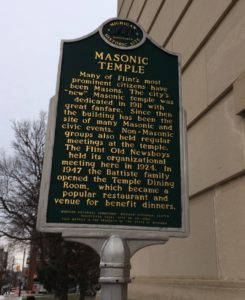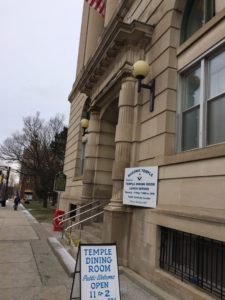By Jan Worth-Nelson
Downtown Flint’s Masonic Temple is not for sale, according to Judy Jones, the Temple manager. “We’d like to squelch those rumors,” she said in late January.
But John Porritt, president of the Flint Masonic Temple Association board, said while the longtime downtown landmark is not for sale “at this time,” the matter has been under consideration because “our income is less than our expenses.”

Flint’s Masonic Temple is a designated “Michigan Historic Site”
And sources who asked not to be named said at least one realtor had turned down a chance to represent the building, and several tentatively interested parties have done walkthroughs of the historic building at the corner of Saginaw and East Fourth streets.
Members of the one remaining lodge providing coordinating activities and income to the building, Fellowship Lodge 236, are hoping a fundraising drive this spring might buy them at least another year.
Lodge 236 “Master Mason” Todd Lamb of Flint is leading the drive, and says the group, which has about 225 members, will try to galvanize around hiring a fulltime marketing manager to promote use of the space for weddings, receptions and other public community uses.
It costs about $120,000 a year to keep the doors open, Lamb said. Members pay annual dues of $125 each, though some lifetime members have been relieved of that duty. Since the Masons are a charitable organization, their ability to contribute to the community could be compromised by having to cover the overhead on the property.
Lamb, a regional sales manager for Emerson Electric, said the decline of membership and financial support has been hit with a triple whammy in Flint: the slow slide of General Motors out of town, the related decrease in the city’s population, and the movement of membership-rich lodges to the suburbs.
And of course, the popularity of membership in fraternal organizations in general has declined among the younger generations, Lamb noted.
At its peak in the Sixties, upwards of 5,000 members in a dozen Masons organizations made use of the Temple, he said. Members have included Walter Chrysler, J. Dallas Dort, C.S Mott, James Whiting and many others.
He said the latest blow to the building’s future came when Fellowship Lodge 23, the oldest lodge in Genesee County and one of only two regularly meeting and contributing income to the Temple, disbanded in December. Flint 23 received its charter in 1855, the same year Flint incorporated as a city, he said.
The only active remaining lodge using the Temple is Fellowship Lodge 236.
These unsettled prospects leave Larry Battiste, owner of the legendary Temple Dining Room, uncertain about his own future and the future of his staff and the restaurant which is celebrating its 70th anniversary this year.
Battiste, whose grandparents opened the dining room in 1947, leases his space in the Masonic Temple. He said he thinks there is untapped potential for use of the facility. He said he hopes the Masonic board will “stay positive” about the options.
“They will have to do what’s right just for them,” Battiste said, coming off a busy 11 a.m. to 2 p.m. weekday lunch shift in the basement eatery. Asked if he would consider going with the Lodge if they go elsewhere, he said it would depend what they offered.

The Masonic Temple at East Fourth and Saginaw streets was dedicated in 1911.
Acknowledging that his business has dropped off over the years as downtown traffic and tastes have changed and his customer base has aged and passed on, he said he also is limited by the outdated aspects of the kitchen.
“We’re running an inefficient operation down here,” he said, “it’s old and inefficient but… it’s what we know. “
His catering business continues to bring in sustaining income, and he has considered doing that full-time if the Temple is sold, but Battiste, who is 63, said, “I’m older now and I don’t have the energy I once did.”
He is assisted in the dining room by his daughter, Christine O’Brien, who said she sees the temple facility as an economical and attractive locale for weddings and other events. Both she and her brother had their wedding receptions there.
Battiste, whose grandparents ran a popular restaurant named Courtavon (at Court and Avon streets) before coming to the Temple, remembers his grandfather sitting him up on a stool as a little boy and letting him make donuts.
He took over management of the dining room in the mid-Seventies, and it’s been his work life ever since.
Regardless of what happens, Battiste said, putting his hand on his heart, the Temple “has given me a good life.”
Lamb noted the difficult decision-making swirling around the Temple now “speaks to a broader concern” — the decline of fraternal organizations in general, and the consequent loss of their benefits to the community.
He noted the Masons regionally had in the last four years alone contributed about $120,000 to Flint community causes – the largest chunk, $100,000, donated to the Community Foundation of Greater Flint fund for the Flint Child Health and Development Fund in response to the water crisis.
In addition, Flint Masons have contributed $2,500 a year to the Flint Public Library in support of literacy development, Lamb said, noting that historically the Freemasons were among early and ongoing supporters of public education in the country.
“When you lose something like that, it has a ripple effect on the community, particularly a community in decline,” Lamb said, “That removes value in a lot of different ways — not to mention the building itself has been a fixture of the downtown landscape for its entire life.”
Construction of the current Temple began in 1908 and the four-story ediface was dedicated in 1911. Lamb said he is interested in historic preservation issues and hopes to explore funding in that direction.
Lamb said some Masons think the battle already has been fought, but he’s not ready to give up.
“We gotta exercise this plan and if in doing it, we fail, we’ll have to take other actions. Those actions could result in us staying in the building and could result in other players in the downtown landscapes participating with us,“ he said.
Lamb appealed on behalf of the building, asking anyone interested in helping preserve the building and keeping it available for the community’s benefit to contact him at todd.lamb@emerson.com.
The Masons, also called the Freemasons, are a worldwide fraternal organization with medieval roots. Some say Freemasonry began as a guild for actual stonemasons, but over the centuries, according to Wikipedia, it evolved into a social organization, sometimes based on Christian texts and sometimes more secular – for centuries banning women from their meetings and cultivating secret rituals.
Often seemingly shrouded in secrecy, more recent incarnations of the organization have removed or modified their restrictions, according to Lamb.
“We are not a secret society. We’re a society with secrets,” he said — most involving handshakes and passwords.
EVM Editor Jan Worth-Nelson can be reached at janworth1118@gmail.com.



You must be logged in to post a comment.